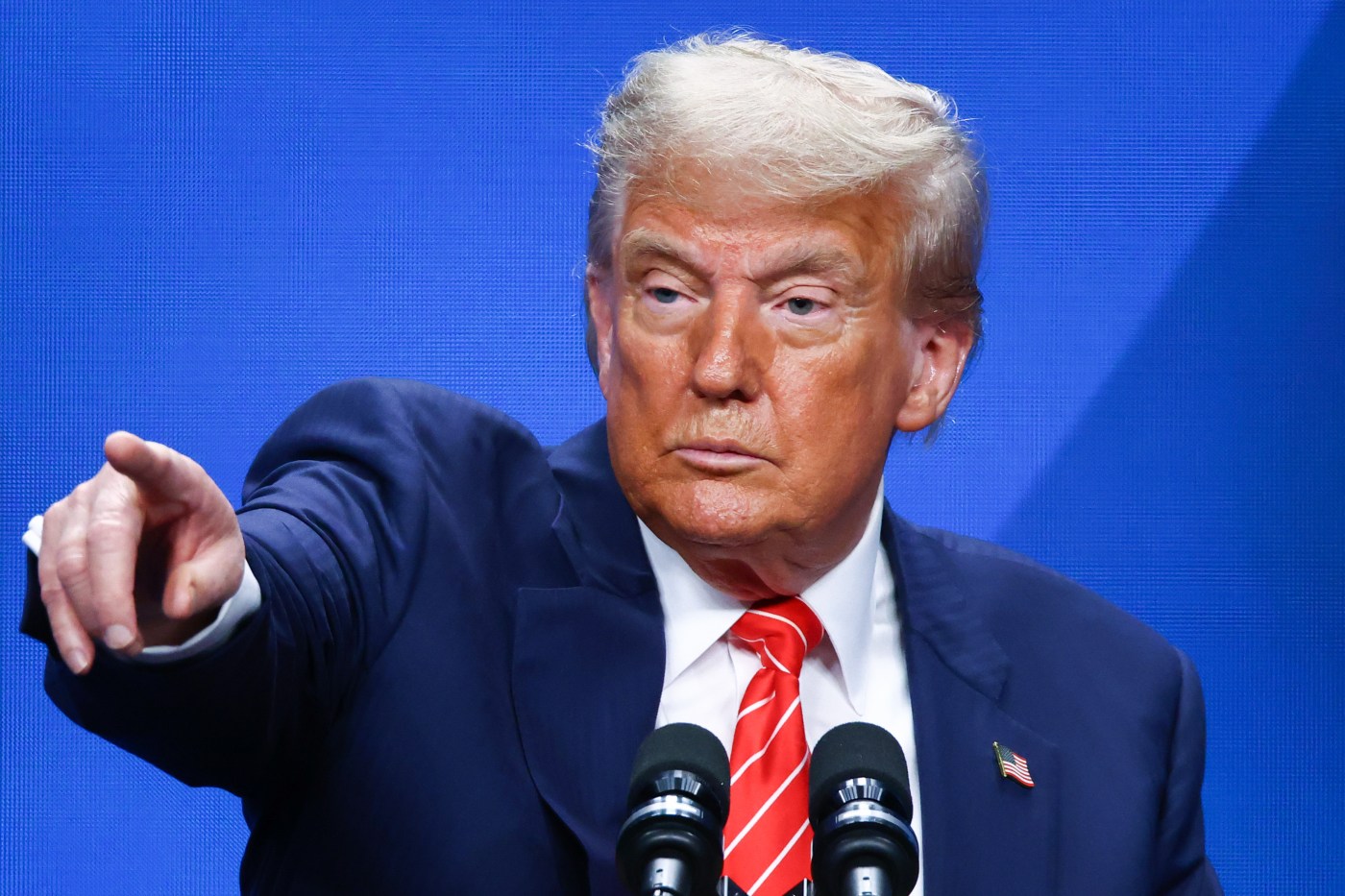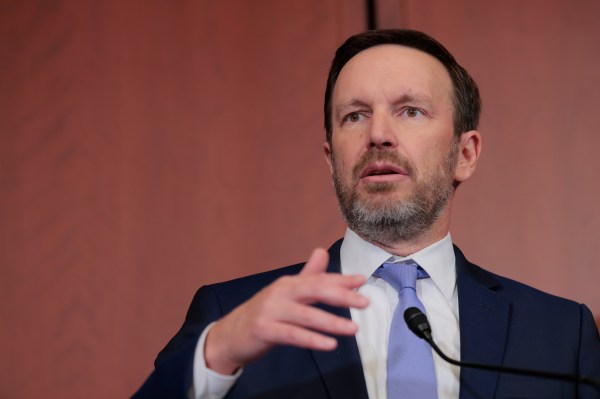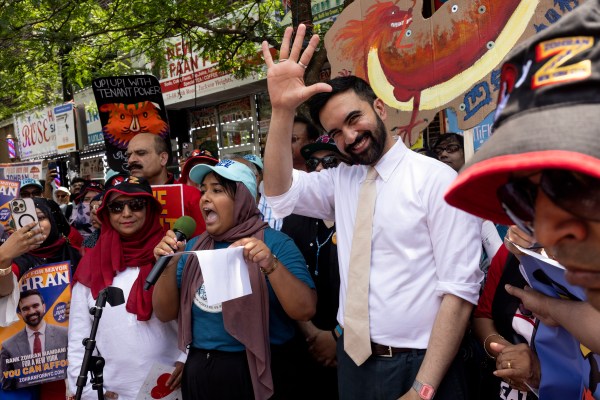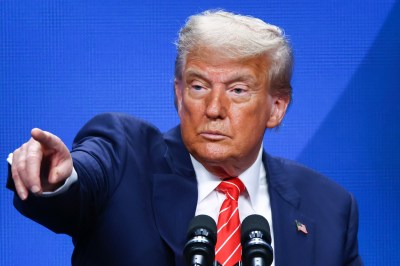One day before President Donald Trump ordered U.S. forces to carry out air strikes on three Iranian nuclear facilities, a reporter asked him about his public criticism of former President George W. Bush’s invasion of Iraq. “How is this moment different with Iran?”
Trump answered that he never believed there were weapons of mass destruction in the Middle East, and that he was “loud and clear” in expressing his opposition to the Iraq War. Here’s his full answer:
Well, there were no weapons of mass destruction. I never thought there were. And that was somewhat pre-nuclear. You know, it was, it was a nuclear age, but nothing like it is today. And it looked like I'm right about the material that they’ve gathered already. It's a tremendous amount of material. And I think within a matter of weeks, or certainly within a matter of months, they were going to be able to have a nuclear weapon. We can't let that happen. I was very much opposed to Iraq. I was, I said it loud and clear, but I was a civilian, but I guess I got a lot of publicity, but I was very much opposed to the Iraq War. And I actually did say, ‘Don’t go in, don’t go in, don’t go in.’ But I said, ‘if you’re going to go in, keep the oil.’ But they didn’t do that.
This is mostly false. In August 2004, Trump said in an interview with Esquire that Iraqi dictator Saddam Hussein never had weapons of mass destruction at his disposal. But he made more ambiguous statements in the years leading up to the U.S. invasion.
In his book, The America We Deserve, published in January 2000, Trump wrote that Iraq had enriched uranium stockpiles and needed only “material for nuclear fission to complete the job” of creating a nuclear weapon. “Saddam Hussein wouldn’t let UN weapons inspectors examine certain sites where the material might be stored. We still don’t know what Iraq is up to or whether it has the material to build nuclear weapons.” Therefore, Trump explained, military action against Iraq may be justified. “I’m no warmonger,” he said. “But the fact is, if we decide a strike against Iraq is necessary, it is madness not to carry the mission to its conclusion.”
He also told Howard Stern in 2002 that he favored invading Iraq, adding, “I wish the first time it was done correctly.” Trump became publicly critical of the war only after it was underway, and he did not recommend seizing Iraq’s oil until several years after the U.S. first invaded.
Still, Trump has for years positioned himself as a full-fledged opponent of U.S. military involvement in Iraq. During a Republican primary presidential debate in February 2016, Trump said he was the only GOP candidate to advocate against invading Iraq. “And I said it loud and strong,” he added. When Trump reiterated that claim later that week during a CNN town hall event in Columbia, South Carolina, CNN host Anderson Cooper asked him about his 2002 remarks to Stern. Trump responded that he did not recall telling that to Stern, though he acknowledged, “but I mean I could’ve said it.” He added, “By the time the war started, I was against it.”
When asked for some of the earliest examples of Trump opposing the Iraq War, White House deputy press secretary Anna Kelly shared in an email to The Dispatch Fact Check three examples of Trump voicing skepticism to the Iraq War, all of which came in 2003 after the U.S. had invaded Iraq. The first came on March 22, 2003, less than a week after Bush ordered the invasion of Iraq. In a San Antonio Express-News article reporting on the Miss USA beauty pageant, which Trump owned from 1996 to 2015, Trump told the news outlet, “War is depressing, but something like the Miss USA pageant is positive and brings you out of that funk.” The second quote was featured in the Washington Post’s coverage of the 75th Academy Awards ceremony, published on March 24, 2003. “The war’s a mess,” Trump was quoted as stating. The third quote came later that year, on the second anniversary of the September 11, 2001, terror attacks, when Trump appeared on MSNBC’s Scarborough Country. “It wasn’t a mistake to fight terrorism and fight it hard,” Trump said to former Florida GOP Rep. Joe Scarborough. “I guess maybe if I had to do it, I would have fought terrorism,” he added, “but not necessarily Iraq.”
But before Bush announced the invasion of Iraq, Trump emphasized the importance of decisiveness when taking military action. As he told Fox News’ Neil Cavuto in late January 2003, the American public is “getting a little bit tired of hearing, we're going in, we're not going in, the—you know, whatever happened to the days of Douglas MacArthur,” a reference to the World War II general who commanded U.S. forces in the Pacific Theater. “He would go and attack. He wouldn’t talk,” Trump added. “We have to, you know, it's sort of like either do it or don't do it.” Two months later, Trump returned to Cavuto’s Fox News show and commented on Bush’s decision to invade Iraq. “The main thing is to get the war over with and just make it a tremendously successful campaign, Trump said, “and it'll be very interesting to see what kind of weapons they find.”
The final component of Trump’s claim—that his view on Iraq was, “if you're going to go in, keep the oil”—is another statement that he made only after the war was underway. Trump did not publicly advocate for seizing Iraq’s oil until years after Bush launched the military operation. When asked in March 2011 about the Iraq War on CNN Business, Trump said, “Why don’t we just take over the oil?” Similarly, less than a month later, Trump told the Wall Street Journal’s Kelly Evans, “I always heard that, when we went into Iraq, we went in for the oil. I said, ah, that sounds smart. Except, we never did.” He added, “I would take the oil.”
If you have a claim you would like to see us fact check, please send us an email at factcheck@thedispatch.com. If you would like to suggest a correction to this piece or any other Dispatch article, please email corrections@thedispatch.com.







Please note that we at The Dispatch hold ourselves, our work, and our commenters to a higher standard than other places on the internet. We welcome comments that foster genuine debate or discussion—including comments critical of us or our work—but responses that include ad hominem attacks on fellow Dispatch members or are intended to stoke fear and anger may be moderated.
With your membership, you only have the ability to comment on The Morning Dispatch articles. Consider upgrading to join the conversation everywhere.